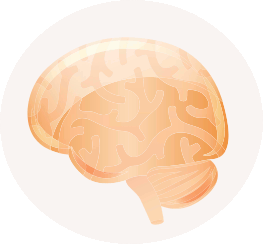SLEEP, STRESS & MENTAL HEALTH

 Categories in Mind Stress SleepTension & BreathStressSleep PatternsEnergy-VitalityThoughts & ComprehensionMood & EmotionsCommunity, Spiritual LifeAddictions and HabitsCentral Nervous SystemPeripheral Nervous SystemBreakdown of Nerve Actions
IntroductionThe mind and the body can't be separated by neat lines - they work together as one. Modern medicine treats mental and physical ailments separately, while Ayurveda views each person as an integrated mind-body system. When the mind is out of balance, there will always be a manifestation in the body, even if it can't be graphed or measured.Imagine you are suddenly faced with an anxiety provoking situation. Maybe you witnessed a road collision, or heard a loved one was rushed to hospital. When your mind becomes frantic, there are immediate effects in your body. You may feel tension in your muscles, a pit in your stomach or your heart may start to pound as stress hormones are released. The mind-body connection is a two way system that also works in reverse. If there is an imbalance of the physical body, this will impact your state of mind and emotional stability. Using anxiety as an example again, an accumulation of toxins in the colon due to improper diet will irritate the nervous system. This toxic accumulation and irritation of the nervous tissue can progress to constant feelings of low level anxiety in the mind. Ayurvedic Anatomy of the MindIn Ayurveda, the nervous system is called majja dhatu, and the mind is called manas. Majja includes the neurons (nerve cells) that transport sensation and experience from the sense organs to the mind. The nervous system is pervasive, reaching every corner of your body so you can sense what is happening both internally and externally.The mind (manas) processes all of this stimulation and tries to organize and make sense of all the sensory input. Nerves (majja) allow you to experience life through sensations and the mind (manas) makes sense of these experiences. The mind refers to how you think, react, and respond to sensations reported by the nervous system. Wherever nerves are present, thinking is also present - so in Ayurveda there are both nerves (majja) and thinking (manas) throughout the body. One could say that the mind is infused in the whole body, not just in the brain. The idea that we have feelings and awareness in various parts of our body is reflected in common sayings such as "gut feelings" or a "broken heart". We feel our emotions in many places of the body. This mind-body connection is a fascinating subject of study. Majja is purely physical, made up of neurons and nerves, but manas is physical and spiritual. Beliefs that you hold about experiences, like what you think about your mom, are attributed to your spirit because beliefs represent free will choices. Only the spirit is free, in the sense that it can act independently of the flesh. Nevertheless, everything that happens to us affects our spirit as we make decisions and draw conclusions from our experiences. In Ayurveda, whenever something happens, it affects your body, your mental state, and your beliefs about the world. Ayurveda's Approach to Mental WellnessAyurveda offers a unique and practical framework for managing the health of the mind and addressing its specific disorders. This framework is based on 20 opposing qualities (gunas). An excess of any of the gunas in your body will incline your state of mind towards certain emotions and feelings. Here are some examples of how the physical gunas in the body impart personality traits in the mind:
The gunas are an integral framework that Ayurveda provides to understand the mind. They are incredibly useful for assessing someone's current mental state, and offers a workable system to bring these gunas into balance. Imbalances of the gunas in the body affect the mind because of majja. Nervous tissue is very sensitive to changes in the blood chemistry (rasa), including any toxins in the blood, and these in turn affect the mind. Digestive toxins (ama) in the bloodstream can irritate nerve tissue, making your nerves feel frayed. Often, these toxins come from the digestive system, so taking care of digestive health is a key factor in supporting mental health. Toxins may come from other sources as well. Ayurveda addresses mental health issues by balancing the gunas in a step by step approach. First, Ayurveda balances digestion and elimination to reduce the amount of accumulating toxins. Then, it uses diet, lifestyle & herbs to correct blood chemistry and balance the gunas in the blood. Along the way, Ayurveda nourishes the nervous system with healthy fats and appropriate herbs. Ayurveda also recommends that you protect your sense organs from gratuitous exposure to disturbing images and thoughts - such as one might encounter in a horror movie. Ayurveda & MeditationAyurveda seeks to stabilize the mind through meditation and prayer, but not just any kind of meditation and prayer. Some forms of meditation advocate complete emptying of the mind, which suppresses the mind and can result in mental confusion. The mind has a purpose, and should not be suppressed. The purpose of the mind is to efficiently lead an organism to what is good and healthy for it.Some forms of meditation advocate complete disembodiment, and these are ultimately unsuitable for physical health and well being. Since meditation affects the person on a spiritual level, great care must be taken to choose a form of meditation that will be truly supportive for the years to come. What Causes an Imbalance in the Mind?The mind is incredibly sensitive and can be easily imbalanced. Here are some causes of mental imbalances
While these causes may not have an immediate impact on your mind, they slowly accumulate and twist the reality in the mind. The mind is supposed to contain an accurate map of reality. However, each person's mind frequently misinterprets reality as well. Incorrect beliefs slowly warp this map of reality over such a long period of time that the individual often has difficulty identifying the true cause. The mistakes of the mind should not cause despair, or indecision, but instead should inspire renewed commitment to understanding and good use of reason. Common AilmentsAnxietyAnxiety is an incredibly common ailment of the mind. Everyone will experience a little anxiety from time to time, but for some individuals chronic anxiety is prevalent on a day to day basis, sometimes for no apparent reason. Ayurvedically, anxiety may be a result of toxins that have accumulated in the colon and an aggravation of Vata (udana vayu). Anxiety is also fueled by past traumas, poor routine, stress and eating at irregular meal times. Finally, anxiety may be caused by too much weight loss, or other deficiencies, a Vata imbalance. To remedy anxiety where a Vata imbalance is the underlying root cause, add healthy fats like ghee to the diet, and a little mineral salt to balance electrolyte levels. Ground Vata with a regular routine including self massage with sesame oil, a regular mealtime and a bedtime routine. deep belly breathing calms feelings of anxiety and helps restore healthy perspective.Irritable, Angry and FrustratedFeeling irritable and angry are classic signs of "hot blood", a Pitta imbalance in the mind (sadhaka pitta). The source of this heat is Pitta ama, which creates inflammation, higher blood pressure, liver stress and feelings of frustration and short temper. To reduce mental irritation, remove any pitta aggravating foods from your diet, including spicy, sour or fermented foods, plus caffeine and alcohol. Follow a Pitta pacifying diet including sweet, cooling foods and cleansing bitters. Alterative herbs like turmeric, aloe vera juice and amalaki cleanse the blood, reduce Pitta ama and can help balance blood chemistry.Fatigue and Brain FogMental fatigue is natural after a long day, but in more serious cases, it is persistent and chronic. Mental fatigue, confusion and a slow, cloudy mind are often a result of aggravated Kapha (tarpaka kapha). Kapha becomes imbalanced in the mind due to a rich, heavy, sweet diet which reduces circulation and creates ama. Instead, eat food with spicy, pungent taste, as it clears and lightens a heavy mind. Trikatu (or "three pungents") stimulates digestion and burns away an accumulation of Kapha ama that creates a sluggish body and mind. A light diet should be followed and Kapha provoking foods avoided. Engage in stimulating exercise first thing in the morning to refresh your mind and combat fatigue.Trouble Falling Asleep / InsomniaA good night sleep may be disrupted for any number of reasons. Perhaps falling asleep seems impossible with a swirling mind of worry, or you find yourself waking up around 1am feeling overheated and can't get back to sleep. For difficulty falling asleep and excessive worrying before bed (Vata), practicing belly breathing, journalling, a few minutes of meditation or prayer, and add a drop or two of lavender essential oil on your pillow. If you are waking up feeling hot and bothered in the middle of the night, Pitta may be imbalanced. In that case rub brahmi oil on your head before bed, turn off all electronics and stop work at least two hours before bed. Dim the lights an hour before bedtime and keep the bedroom cool in summer.Heavy Sleeping / Tired & GroggyPerhaps you get a great night's sleep but the issue is getting out of bed and shaking off the morning fatigue. If sleep is deep but the mornings are a struggle (Kapha), set an alarm to rise early, before 6am each day. Drink a glass of hot water, with juice from a wedge of lemon, 10 drops of apple cider vinegar, a pinch of cayenne, and a teaspoon of honey. Then, do some stimulating exercise like a brisk walk in the fresh air. Also, make sure to have a light evening meal and avoid any rich or heavy food at night.Tonics for the MindTonics nourish and ground the nervous system. They can rejuvenate the mind and build mental strength.Vata Mental TonicsVata disorders tend to be light, dry and mobile (like anxiety, fear and worry), so tonics should be heavy, oily and grounding. Oil nourishes and strengthens your nerves. Self massage with sesame oil is recommended for Vata. This warming, unctuous oil soothes the nervous system and pacifies Vata. It's also good to include healthy fats, like ghee or raw sesame oil, in your diet. Avoid bad fats, such as the overheated fats in fried foods. Shankhapushpi can be used to reduce insomnia and anxiety. Ashwaghanda is a staple tonic for Vata as it calms a hyperactive mind, helps the body adapt to stress, builds strength and rejuvenates tissues.Pitta Mental TonicsImbalances of the mind that are hot, sharp and penetrating (like anger, frustration and stress) are related to Pitta dosha. Tonics for Pitta disorders should be cooling and calming. Regular Self massage with coconut oil calms Pitta and soothes nervous tissues, as coconut oil is cooling. Bhringaraj oil can be used for a scalp massage as it reduces mental aggravation as a result of high Pitta and tones the nervous system. A few drops of brahmi oil in each nostril also cools the mind, reduces mental stress and increases strength in the mind including memory and concentration.Kapha Mental TonicsKapha disorders of the mind are heavy, dull and slow, such as depression. Tonics for a Kapha mind should be light and invigorating to reduce the damp, heavy sluggish feeling. Shilajit is warm, light, drying and penetrating. It lifts mental sluggishness, depression and mental ama associated with Kapha. It rejuvenates the mind and helps clear brain fog. Kapha individuals can rub Vacha powder on their skin and take ginger baking soda baths to stimulate their body.ConclusionThe health of the mind has a powerful impact on the health of the body, and vice versa. The body and mind are intricately connected, and both must be taken into consideration when seeking health and wellness. While disorders of the mind are common, Ayurveda offers a practical system of balancing the gunas in the blood and reducing digestive toxins to stabilize and strengthen the nervous system. Ayurveda also promotes a diet and lifestyle compatible with your doshas to reduce mental imbalances. Rejuvenative tonics can be used to nourish and promote lasting health of the mind - leading to stable decisions that promote your happiness each day.Herbal Actions Affecting Mind Stress Sleep
HOW AYURVEDA WORKSARE YOU WONDERING HOW AYURVEDA CAN HELP YOU?WHY IS AYURVEDA THE RIGHT SOLUTION?Ayurveda strengthens the body while opposing disorders. It takes a holistic, systemic approach that looks at the whole body. Ayurveda shows how to interpret signs and symptoms of imbalance, and how to address them using diet, lifestyle adjustments, and herbs. It shows a person how to optimize their health on a continual basis. You can't take the doctor home with you, but you can take Ayurveda home with you. Ayurveda is the most advanced and easy to use home system for self healing.HOW DOES AYURVEDA WORK?Ayurveda starts by identifying your body type, which identifies certain tendencies in your body to get sick (as well as identifying your strengths). It uses body type to determine the likely root causes of your disorders. Next, Ayurveda analyzes the nature of your disorder. It fits all your signs and symptoms into a pattern, expressed as a combination of biocharaceristics (gunas). For example, you may have a heat disorder, a cold disorder, or an oily disorder, etc. This simple categorical approach shows you how to correct systemic imbalances and strengthen your body as a whole.On Joyful Belly, we've created an extensive categorization of food so you can easily match food to your imbalanced biocharacteristics. By eating an optimal diet that balances your biocharacteristics, your whole body is strengthened and the conditions that created the disorder are removed. Once the root causes of the disease are removed, the disease lessens in strength or disappears altogether. Additional remedies - such as herbs and lifestyle practices - focused on the specific disorder, can greatly enhance your healing. GET STARTEDTo get started on your Ayurvedic journey, we first recommend that your find your body type by taking our free quiz. In Ayurveda, every solution is based on your unique body type, so by taking this quiz, you’ll get the best results. |
Join Joyful Belly.
Want our top Ayurvedic recipes and health tips?Subscribe to our free newsletter!






